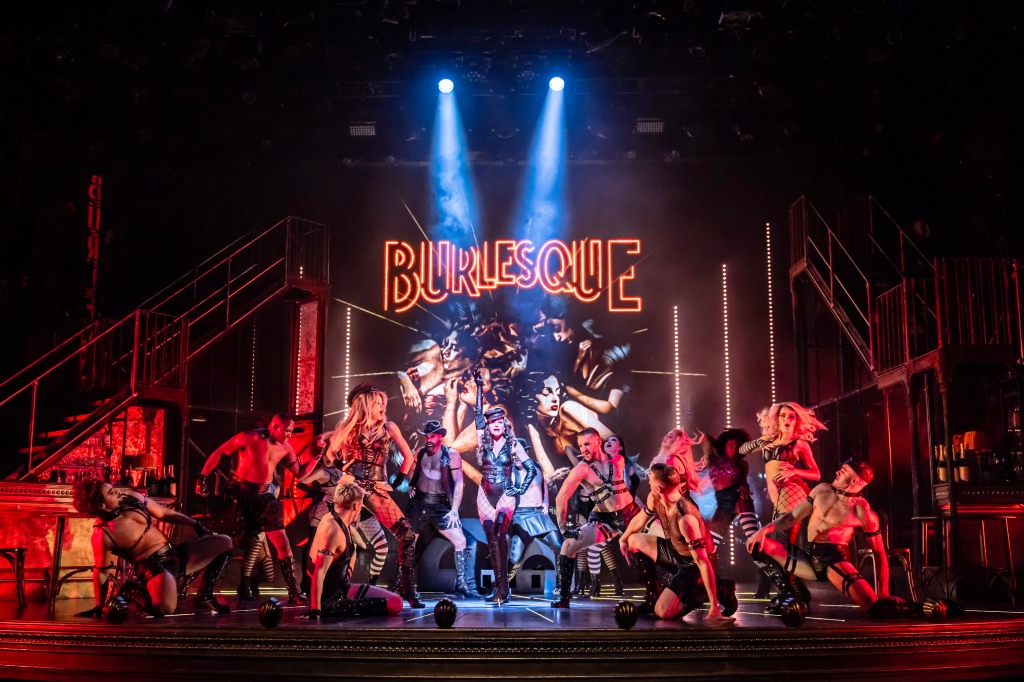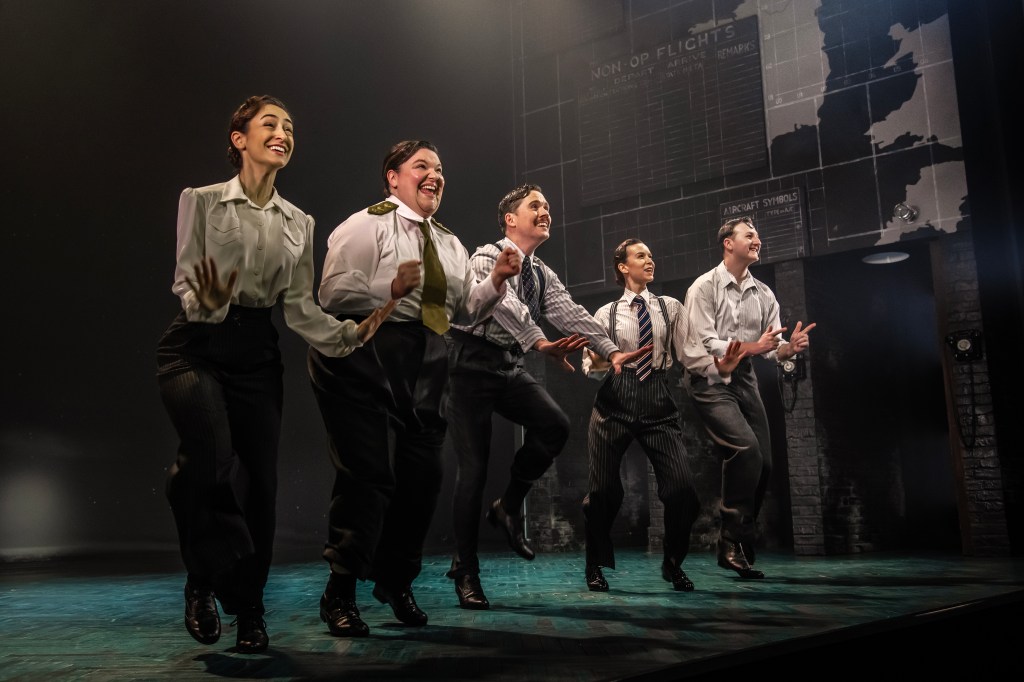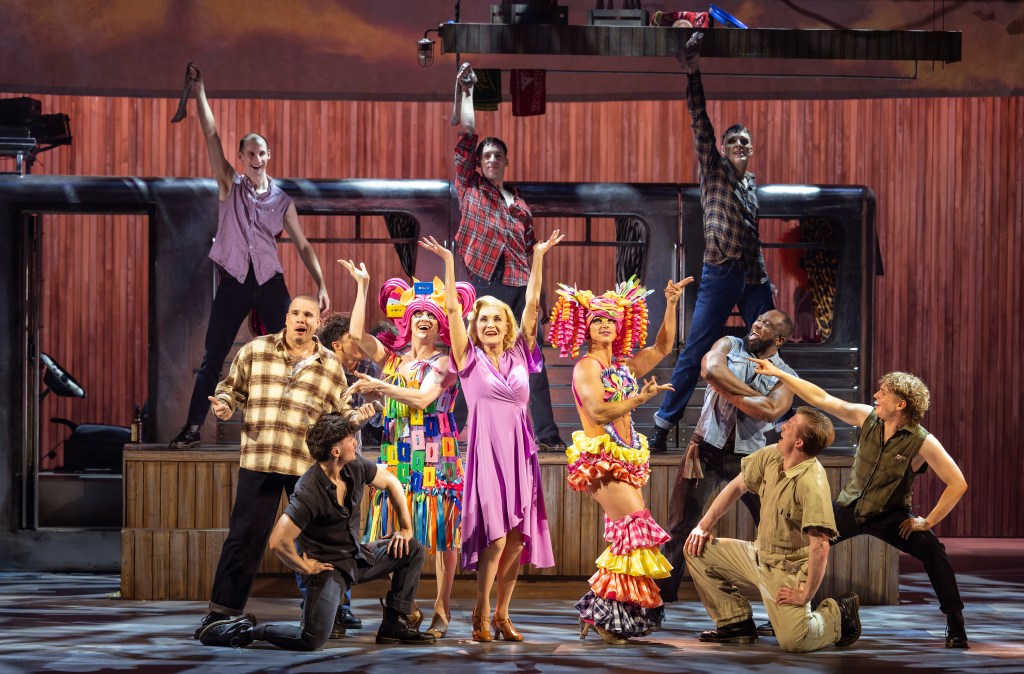★★★★☆
Burlesque is “a big new musical” based on the iconic musical film of the same name, which was released in 2010. The musical is currently having its world premiere at the Opera House Manchester, a venue which has played host to many world premieres over the years, from Ghost and & Juliet to Back to the Future and, most recently, I Should Be So Lucky.
The stage musical is noticeably different to the film. In the film, Ali (Christina Aguilera) abandons her small town and moves to LA to pursue her dreams; she joins a struggling burlesque club, owned by the icy Tess (Cher), and her remarkable singing helps save it. It’s not the strongest plot – some might even say, style over substance – but it works wonderfully; it’s an easy-watch unashamedly made for the gals and gays. But a 2.5 hour musical needs more plot and meat…
Like in the film, Ali’s mother is deceased and she works in a diner, but in the musical, her late mother left her the diner and also a letter revealing that she is not her birth mother. Ali jets off to New York to find her birth mother.
“Small-town girls moves to the big city to make her dreams come true” is overdone and clichéd (though a reality of life) so writer and producer Steve Antin (who wrote and directed the film) has given her a more important motivation. The stakes are higher and there is more conflict so the resolution is more impactful.
There are a lot of changes. Some changes work better than others. Some people will like the changes; some will (and do) not. I watched the film for the first time just two days before gala night – I had been meaning to watch it for 14 years! – so I’m not offended by any changes, even though I think that some things should change back…
One of the most successful changes occurs at the beginning (a change I had anticipated when watching the film). The film’s opening song, ‘Something’s Got a Hold On Me’, is fantastic, but it’s not a show-stopping number, so the creatives have instead opened the show with a Todrick-led prologue and Tess’ big number, ‘Welcome to Burlesque’ – immediately welcoming the audience to the show, this world, and the burlesque bar. This means that the number is now the audience’s introduction to the club, not Ali’s, but it works.
Ali then performs ‘Something’ in a gospel choir rather than in the diner; it feels much more musical theatre. Todrick, here playing the choirmaster, gets an early laugh by calling Ali, “Beyoncé trapped in a Taylor Swift body.”
Another noticeable change is that the burlesque troupe now includes men – a more accurate depiction of modern-day cabarets and burlesque shows, whose primary audience is the gals and gays (straight men go to strip shows – and burlesque is not stripping!). However, it’s a shame that everybody is so conventionally fit. There is a real missed opportunity in not casting performers with more body diversity – which cabarets and modern-day burlesque not only embrace but champion.
Some less successful changes include the extra focus put upon Ali’s (Jess Folley) relationship with Jackson (Michael Mather) – it’s too much romance – and the (mis)handling of the love-triangle with Jackson’s girlfriend, which reduces the tension established in the film.
Mather makes for a loveable Jackson but the character could be written to be more interesting – especially when compared to all the other big characters. Sometimes, “the boyfriend” is written to be more “normal” to create a contrast with “the girl’s” other life (à la Nate in The Devil Wears Prada) but Jackson literally works in the burlesque bar and has written a song about burlesque – he is very much a part of that world.
Folley had no easy job playing a character originally played by Xtina – one of the best vocalists of all time – but she kills it. She hits all the right riffs, runs and roars, embodying Xtina whilst also bringing her own flavour to the role.
At the press call, Broadway star Jackie Burns told me that she was playing a reimagined Tess, not wanting to imitate Cher, but would be adding a few sprinklings of Cher to the role – fan service! Burns is striking as the younger, sexier Tess, with vivacious vocals that will blow you away.
Todrick plays Sean, whose role has been expanded in the film. He’s also something of an emcee and a narrator. There’s something a bit liminal about the role but it works in this world of magic and mystique. Sean is very much a supporting character but Todrick chews up the scenery whenever he is onstage.
Folley, Burns and Hall create an unholy trio, battling it out throughout the night to be the star of the show, each getting their moment to shine in the spotlight.
Nina Ann Nelson plays Nikki, the club’s main attraction, who feels threatened by Ali. She oozes sass – and trouble.
Olivier Award winner George Maguire plays Tess’ ex-husband, Vince – a composite character of the film’s Vince and Marcus, the latter of whom wanted to buy the club. The closest the film comes to having a villain is Nikki (Marcus is a problem but he’s not villainous), but generally a stage musical needs a baddie. However, Vince never feels that threatening; this storyline could be handled better – more realistically and interestingly. Maguire, though, is fantastic – when is he not?
The epic ensemble includes Jess Qualter (of Brookie and Jessie). With six major characters, the ensemble are very much in the background, but they enhance every scene that they are in. It’s hard to standout in an ensemble, and this entire cast is mesmerising, but Stefan Lagoulis is especially striking.
The dance numbers (choreographed by director Nick Winston) are marvellous – though some of them could be even bigger.
The burlesque – in the movie musical and stage musical alike – is not burlesque in the traditional sense. It feels more like choreographed dancing in lingerie (though the stage musical does have one striptease number – though it’s still not typical burlesque). Antin’s exposure to burlesque was, no doubt, through his sister, Robin, who founded the Pussycat Dolls – which was a dance troupe before it was a girl group. Robin is involved with the stage musical as a creative co-producer and associate choreographer.
My friend, Cherie Bebe, Manchester’s Queen of burlesque, told me the that a lot of burlesque performers dislike the film because they do not see it as an accurate depiction of burlesque – but she recognises that it is an alternative type of burlesque, and a decade ago, that’s the type that she was booked for more (before striptease was, thankfully, re-popularised).
Sutra Gilmour’s set is spectacular, with lots of moveable elements, including versatile ladders and frames which are successfully used for a number of different things.
There is a revolve – and a raised revolve – which is used to masterful effect, not only in the big dance numbers. A memorable use of the revolve includes an early argument between Ali and Tess; Tess forces an unwilling Sean to tell Ali to leave. “I feel like the room is spinning,” he says as the stage turns. Later, during a romantic duet between Ali and Jackson, the revolve spins as the images on the background move in a circular way – it is designed so well.
The use of screens and moving images (Nina Dunn) in place of set is becoming a bit tiresome but Burlesque uses them not in place of set but rather to enhance it.
Scenes are brought to life with Jack Knowles’ lighting design and Ben Harrison’s sound design.
Ryan Dawson Laight clearly had fun with his costume designs – they’re all fabulously camp, especially the BDSM-inspired stuff – with Carole Hancock having made some wonderful wigs.
The score, too, is sublime. Christina Aguilera, Sia and Dianne Warren have rewritten their songs from the film. Some of the changes work – they reflect changes in the story (though, again, some of the changes do not work) – but others feel unnecessary.
Some pretty banging lyrics have been scrapped, from “Add a little smoke” and “Give it to the band” in ‘Welcome to Burlesque’ to “The dress is Chanel” in ‘But I Am a Good Girl’ (now just ‘Good Girl’).
Tess’ Warren-penned ballad, ‘You Haven’t Seen the Last of Me’, is now performed much earlier on; it no longer feels like a reflection but rather a stepping stone for Tess’ arc into the next act. This change is probably because Tess’ resolution is rather different to the film – and another number is performed in the place of this. Some people won’t like this but nobody can dent Burns’ vocal prowess.
Arguably the film’s most popular song, ‘Express’, opens the second act – this placing is brilliant; it immediately draws the audience back in after the interval. The finale, ‘Show Me How You Burlesque’, is now an Ali-led ensemble number (when watching the film, I was a bit disappointed that only Ali gets to sing the closing number, but I appreciate that the song was strategically released as an Xtina single).
New songs have been penned by Folley and Todrick. Todrick was impressed by my question about the difficulties of writing new songs for a musical that already has songs – and getting the balance right between making the songs feel fresh but also suiting the sound and vibe of the originals. Stay tuned for the interview to find out what he said!
Todrick told me that he had first been asked to compose the songs. He performed one of them for the creatives and hoped that they’d cast him – within no time, they asked him to play the part!
Todrick’s songs feel very Todrick, especially his companion numbers, ‘Big’ and ‘Bigger’, the former of which offers an history of burlesque (from Dita Von Teese to the Pussycat Dolls). A standout number is the Todrick-penned ‘Suggar Daddy Diet,’ which serves as Nikki’s introductory number. Who needs breakfast at Tiffany’s when you can have “diamonds for breakfast”?! Nikki gets some brilliant lines, including, “If the devil wears Prada, who cares what angels wear?” in a later song.
Burlesque is bodacious musical. Fun but flawed. For a show that is still in its preview phase, it’s pretty darn good. The creatives now have months to iron out the creases in the book.
Indeed, the book sometimes feels like different-coloured, different-sized papers all crammed together into a cover that is too small. The script, too, has a few problems, with the writing occasionally feeling, at best, clunky and, at worst, cringey.
Most audiences won’t care about this, though – the film, itself, was hardly groundbreaking; it’s pure fun. But it was groundbreaking in that it revived interest in a breathtaking art form and entertained millions of millennials, especially the queer community, who were, no doubt, drawn in by the casting of two queer icons and remain so grateful for the film. Some of the film’s fans unsurprisingly feel protective about it and thus dislike some of the changes – some of which are as “big” as the “big new musical” itself.
Burlesque completes it world premiere run at Opera House Manchester on June 29. But you haven’t seen the last of Burlesque… It will have its Scottish premiere at Theatre Royal Glasgow, where it runs from September 11 to 28, before returning to Opera House Manchester from October 3 to November 2 – ahead of a West End transfer.
Photo: Johan Persson



